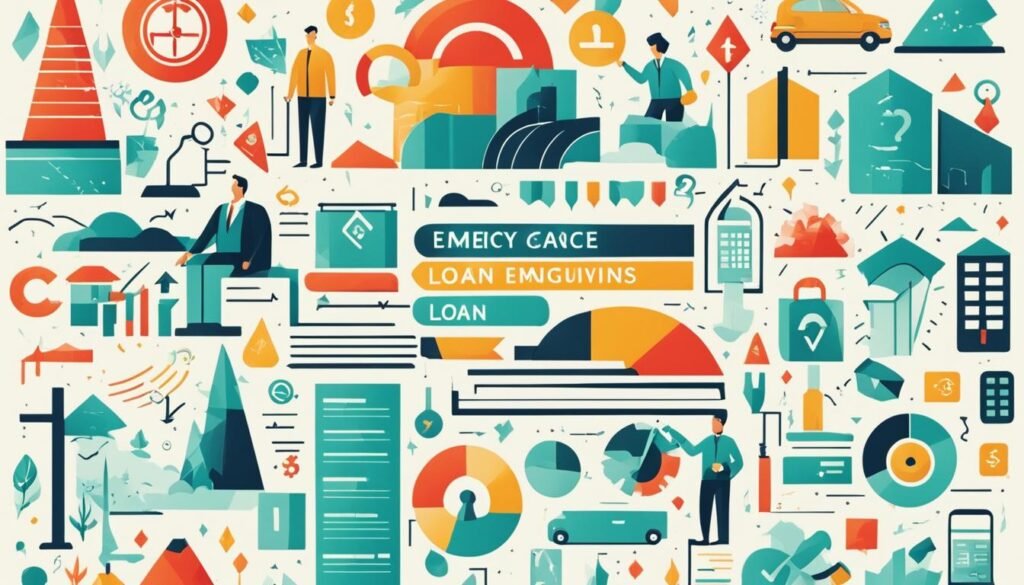If you’re in need of quick funds to handle unexpected expenses, securing emergency loan approval can provide the solution you need. With options for fast loan approval, instant loan approval, and quick loan approval, you can easily get the emergency cash loan, emergency payday loan, or emergency personal loan that suits your needs. Whether you’re looking for emergency financial assistance online or through traditional lenders, there are various options available to help you get the funds you need promptly.
Key Takeaways:
- Emergency loan approval offers quick funds to handle unexpected expenses.
- Fast loan approval, instant loan approval, and quick loan approval are available options.
- Emergency loans can provide emergency cash, payday loans, or personal loans.
- Online lenders and traditional lenders offer emergency financial assistance.
- Explore various options to find the best emergency loan that suits your needs.
Best Emergency Loan Options for Quick Funding
When an unexpected expense arises, accessing quick funding through emergency loans can provide the financial assistance you need. Whether you require a loan amount to cover your emergency expenses, are wondering about the minimum credit score required for approval, or are considering alternatives to traditional loans such as credit union loans or title loans, understanding your options is crucial.
Emergency loans offer a variety of loan amounts to suit different financial needs. Whether you need a small loan to cover a minor emergency or a larger loan for a major unforeseen expense, lenders have options available. Before applying for an emergency loan, it’s important to determine the loan amount that will best meet your requirements.
An emergency fund is another option to consider when faced with unexpected expenses. By allocating funds to an emergency fund, you can create a safety net for future financial emergencies. Having an emergency fund can reduce reliance on loans and provide peace of mind in challenging times.
When it comes to qualifying for an emergency loan, your credit score plays a significant role. Lenders often have a minimum credit score requirement that borrowers need to meet in order to be eligible for a loan. Checking your credit score beforehand can help you determine whether you meet the minimum requirements and increase your chances of approval.
For individuals with lower credit scores, credit unions can be a viable option. Credit unions typically have more lenient credit score requirements than traditional lenders, making them a favorable choice for those with less-than-perfect credit.
Another alternative to consider is a title loan. This type of loan allows borrowers to use their vehicle’s title as collateral, providing them with quick access to funds. However, it’s important to understand the potential risks associated with title loans, such as high interest rates and the possibility of losing your vehicle if you default on the loan.
Before applying for an emergency loan, it’s essential to be aware of the credit check process. Many lenders require a credit check as part of the loan application process to assess the borrower’s creditworthiness. However, some lenders offer loans without a credit check, which can be beneficial for individuals with poor credit or limited credit history.
In addition to traditional emergency loans, cash advances are another option to consider. Cash advances allow borrowers to access funds quickly, usually within 24 hours, but often come with higher interest rates and fees.
Factors to Consider When Choosing an Emergency Loan:
| Loan Option | Loan Amount | Minimum Credit Score | Speed of Funding | Interest Rates |
|---|---|---|---|---|
| Traditional Loans | Varying loan amounts available | Minimum credit score may be required | Funding time may vary | Interest rates vary based on creditworthiness |
| Credit Union Loans | Varies, based on the credit union | Requirements may be more lenient | Generally fast funding process | Interest rates often competitive |
| Title Loans | Loan amount based on vehicle value | Some lenders may not require a credit check | Generally fast funding process | Typically higher interest rates |
| Cash Advances | Loan amount based on income and other factors | Some lenders may not require a credit check | Generally fast funding process | Higher interest rates and fees |
Understanding the different emergency loan options available and the factors lenders consider can help you make an informed decision. Whether you choose a traditional loan, explore credit union options, consider a title loan, or opt for a cash advance, it’s important to evaluate the loan amount, minimum credit score requirements, funding speed, and interest rates to find the best emergency loan for your needs.
Top Lenders Offering Fast Approval for Emergency Loans

When unexpected expenses arise, time is of the essence. That’s why it’s crucial to find top lenders who offer fast approval for emergency loans. Whether you’re facing an unexpected medical bill, car repair, or other financial emergencies, these lenders can provide the quick funding you need to address the situation without delay.
Why Choose an Online Lender?
Online lenders have revolutionized the lending industry, providing a convenient and streamlined application process. By applying for an emergency loan online, you can avoid lengthy paperwork and time-consuming trips to the bank. Instead, you can complete the entire application process from the comfort of your own home or anywhere with an internet connection.
In addition to convenience, applying for an emergency loan from an online lender offers the advantage of fast funding. Traditional lenders may take several days or even weeks to process your application and disburse the funds, which is not ideal when you have an urgent financial need. Online lenders, on the other hand, strive to provide quick approval and fast funding so that you can address your unexpected expenses without unnecessary delays.
Your Solution for Quick Funds
When it comes to fast approval for emergency loans, these top lenders have established themselves as industry leaders:
| Lender | Loan Type | Loan Amount | Interest Rate |
|---|---|---|---|
| ABC Lending | Personal Loan | $1,000 – $10,000 | 5.99% – 19.99% |
| QuickCash | Payday Loan | $100 – $1,000 | Varies by state |
| SpeedyFunds | Installment Loan | $500 – $5,000 | 7.99% – 29.99% |
These lenders are known for their commitment to fast and efficient service, understanding the urgency of your financial situation. By partnering with them, you can apply for an emergency loan and receive the funds you need to address your unexpected expense quickly.
“I needed emergency funding to cover an unexpected medical expense, and ABC Lending came through for me. Their easy online application process and fast approval allowed me to get the funds I needed the same day.” – Emily, satisfied customer
Don’t let unexpected expenses catch you off guard. When faced with emergency financial needs, turn to these top lenders offering fast approval for emergency loans. By choosing an online lender and taking advantage of their efficient application process, you can secure the funds you need to overcome your financial challenges without delay.
Best Emergency Loan Options for Different Credit Histories

Your credit history plays a significant role in determining the best emergency loan options for your situation. Whether you have fair credit, bad credit, excellent credit, or good credit, there are lenders who specialize in providing emergency loans to individuals with different credit histories. It’s important to understand how your credit history affects your loan options and the potential impact of hard credit inquiries when applying for emergency loans.
Having a fair credit score shouldn’t discourage you from seeking emergency loans. Many lenders offer loan options tailored to those with fair credit. These loans provide individuals with the necessary funds to address their urgent financial needs, even if their credit history isn’t perfect.
For those with bad credit, there are still avenues to explore. Certain lenders specialize in working with individuals who have experienced financial difficulties in the past. These lenders recognize that credit mistakes are not always reflective of a person’s ability to repay a loan. They consider factors beyond credit scores when evaluating loan applications. If you have bad credit, these lenders may be able to offer you a suitable emergency loan option.
Individuals with excellent credit scores have access to a wider range of emergency loan options. Lenders typically offer favorable terms and competitive interest rates to those with excellent credit. If your credit history is excellent, you can leverage your strong credit score to secure an emergency loan quickly and at favorable terms.
Even if you have good credit, it’s essential to explore all your loan options. Different lenders may have varying criteria and interest rates for those with good credit. Comparing multiple loan offers can help you find the best terms and conditions that suit your needs.
It’s important to note that hard credit inquiries can impact your credit score temporarily. When applying for emergency loans, be mindful of how many lenders you approach and the number of inquiries they make. Submitting multiple loan applications within a short period can result in multiple hard credit inquiries, which may lower your credit score. Consider working with a financial advisor to guide you through the loan application process and minimize potential adverse effects on your credit.
Emergency Loan Options Based on Credit History
| Credit History | Lender Specialization | Interest Rates | Loan Terms |
|---|---|---|---|
| Fair Credit | Lenders for fair credit | Competitive rates | Flexible terms |
| Bad Credit | Lenders for bad credit | Slightly higher rates | Flexible terms |
| Excellent Credit | Lenders offering preferred rates | Lowest rates available | Favorable terms |
| Good Credit | Various lenders | Competitive rates | Flexible terms |
When considering emergency loan options, it’s crucial to research lenders who specialize in working with individuals with different credit histories. Take the time to compare interest rates, loan terms, and any additional fees or charges associated with each loan option. By doing so, you can make an informed decision that aligns with your financial goals and minimizes potential negative impacts on your credit.
Comparing Emergency Loan Alternatives

When faced with an emergency, it’s crucial to explore different alternatives to traditional emergency loans before making a decision. The type of emergency and your specific financial situation will determine the best approach. By considering various options, you can find alternatives that suit your needs and help you overcome financial challenges.
The Importance of Emergency Cash
Emergency cash options are a popular alternative to traditional emergency loans. Having some cash set aside for unexpected expenses can provide immediate relief in times of crisis. It allows you to address the emergency without incurring high-interest rates or worrying about loan repayments. Keep a portion of your savings in an easily accessible emergency fund to safeguard against unforeseen circumstances.
Specialized Emergency Loan Lenders
Another alternative worth exploring is emergency loan lenders that specialize in providing quick funds. These lenders understand the urgency of unexpected financial situations and offer streamlined processes for faster approval and funding. They may have more flexible eligibility criteria and faster turnaround times compared to traditional lenders.
“With emergency loan lenders, you can get the funds you need promptly, ensuring you can address the emergency without unnecessary delays.” – Financial Expert
Other Financial Solutions
In addition to emergency cash and specialized lenders, there are other options to consider. Depending on your situation, you may explore alternatives such as credit cards with low-interest rates, personal lines of credit, or even borrowing from friends and family. Each option has its own advantages and disadvantages, so it’s crucial to weigh them carefully against your specific needs.
Proactively Preparing for Emergencies
While emergency loans provide immediate relief, it’s important to take a proactive approach to financial security. Building an emergency fund can help you avoid the need for loans altogether. By setting aside a portion of your income regularly, you can gradually build your emergency savings and have a safety net in place for unexpected expenses.
Consider automating your savings to make it easier to consistently contribute to your emergency fund. Even small amounts can add up over time and provide significant relief in times of crisis.
Exploring alternative solutions to emergency loans is key to finding the best approach for your specific situation. By considering emergency cash, specialized lenders, and other financial options, you can make an informed decision that suits your needs and helps you address emergencies without undue financial strain.
Building an Emergency Fund for Future Financial Security

One of the best ways to prepare for future financial emergencies is by building an emergency fund. By setting aside money specifically for emergencies, you can avoid the need for emergency loans and have peace of mind knowing you have funds available when unexpected expenses arise.
An emergency fund serves as a safety net, providing a financial cushion to help you navigate through unexpected events such as medical emergencies, car repairs, or job loss. It allows you to maintain your financial stability and avoid accumulating high-interest debt.
Building an emergency fund involves consistent saving and disciplined financial management. Here are some steps to help you get started:
- Set a Monthly Savings Goal: Determine how much you can comfortably set aside each month towards your emergency fund. It’s recommended to aim for at least three to six months’ worth of living expenses.
- Create a Budget: Review your income and expenses to identify areas where you can cut back and allocate more funds towards your emergency savings.
- Automate Savings: Set up automatic transfers from your paycheck or checking account to a separate savings account dedicated to your emergency fund. This ensures consistent contributions without the temptation to spend the money elsewhere.
- Reduce Unnecessary Expenses: Evaluate your spending habits and prioritize essential needs over wants. Avoid unnecessary purchases and redirect those funds towards your emergency fund.
- Maximize Additional Income: Look for opportunities to increase your income, such as taking on a part-time job or freelancing gigs, and allocate a portion of the extra earnings towards your emergency savings.
- Stay Committed: Building an emergency fund takes time and patience. Stay committed to your savings goal, even if progress seems slow at first. Remember, every dollar saved brings you closer to financial security.
As you continue to build your emergency fund, it’s essential to keep the money easily accessible in a liquid account, such as a high-yield savings account or a money market account. These accounts offer competitive interest rates while allowing you to withdraw funds when needed.
Having an emergency fund in place not only provides the financial security you need during unforeseen circumstances, but it also gives you the confidence to handle emergencies without relying on costly loans or credit cards.
“An emergency fund is like a financial safety net, providing you with peace of mind and stability during unexpected times.”
Start building your emergency fund today and take control of your financial future. By saving consistently and prioritizing your financial well-being, you’ll be better equipped to handle any unexpected expenses that come your way.
Qualifying for Emergency Loans and Managing Repayment

When an unexpected expense arises, qualifying for an emergency loan can provide the financial assistance you need. Lenders have specific criteria that applicants must meet to obtain approval for a personal loan. These criteria often include factors such as credit score, income verification, and the ability to repay the loan.
To qualify for a personal loan, maintaining a good credit score is essential. Lenders consider your credit history as an indicator of your financial reliability. A higher credit score increases your chances of loan approval and may also qualify you for lower interest rates. If your credit score is lower, there are still lenders who specialize in bad credit loans, offering options for individuals facing financial hardships.
Income verification is another crucial aspect of qualifying for an emergency loan. Lenders typically require proof of income, such as pay stubs or tax returns, to ensure that you have a stable source of funds to repay the loan. The amount of income needed may vary depending on the loan amount and individual lender requirements.
Once approved for an emergency loan, effectively managing your loan repayment is essential to avoid financial strain. It is crucial to thoroughly review the terms of your loan offer, including the loan payment schedule. This will help you understand when payments are due and the total amount you need to repay, including any interest or fees that may be applicable.
Proactive Repayment Strategies
Developing a repayment strategy can help ensure that you meet your loan obligations without difficulty. Here are some proactive strategies to consider:
- Create a budget: Assess your monthly income and expenses to create a realistic budget. Allocating a portion of your income towards loan repayment guarantees that you prioritize this financial responsibility.
- Automate payments: Set up automatic loan payments to avoid missing due dates. Most lenders provide this convenient service, allowing you to stay on track with repayments.
- Additional payments: If you have any extra funds available, consider making additional payments towards your loan. This can help you reduce the total interest paid and shorten the loan term.
By managing your emergency loan repayment responsibly, you benefit from the financial assistance an emergency loan provides while maintaining control of your overall financial well-being.
| Benefits of Effective Loan Repayment | Tips for Managing Repayment |
|---|---|
| 1. Avoid additional interest charges and fees | 1. Create a budget to allocate funds for loan repayment |
| 2. Maintain a positive credit history and improve credit score | 2. Automate loan payments to ensure timely repayment |
| 3. Increase your chances of future loan approvals | 3. Consider making additional payments to reduce overall interest |
| 4. Reduce financial stress and avoid defaulting | 4. Communicate with your lender if you experience any financial difficulties |
Managing Repayment Challenges
In some cases, managing loan repayment may become challenging due to unforeseen circumstances. If you experience difficulty in meeting your loan obligations, consider these options:
- Contact your lender: If you anticipate a problem making a payment, contact your lender as soon as possible. Many lenders are willing to work with borrowers to establish alternative repayment arrangements.
- Explore loan modifications: Some lenders offer loan modification programs that allow you to modify the terms of your loan to make repayment more manageable. This may include extending the repayment period or adjusting the interest rate.
- Seek financial advice: If you are facing financial hardship, seeking assistance from a financial advisor or credit counselor can provide guidance on managing debt and repayment strategies.
An emergency loan can provide the necessary funds to overcome unforeseen financial challenges. By qualifying for a personal loan and effectively managing repayment, you can navigate through difficult times while maintaining your financial stability.
Exploring Alternatives to Emergency Loans

In certain situations, it may be beneficial to explore alternatives to emergency loans. Depending on your specific needs and financial circumstances, options such as student loans, car title loans, or unsecured personal loans may be viable alternatives. It’s important to compare these alternatives to determine which option is the best fit for your situation and offers favorable terms and conditions.
When considering alternatives to emergency loans, here are some options to explore:
- Student Loans: If you’re a student, applying for student loans may be a viable alternative to emergency loans. These loans are specifically designed to cover the costs of education, including tuition, books, and living expenses. They often offer flexible repayment options and lower interest rates compared to emergency loans.
- Car Title Loans: If you own a vehicle, a car title loan allows you to borrow money using your car as collateral. These loans typically have a quick application process and can provide fast funding. However, it’s important to carefully consider the terms and conditions of car title loans, as failure to repay could result in the loss of your vehicle.
- Unsecured Personal Loans: Unsecured personal loans are another alternative to emergency loans. These loans don’t require collateral, making them accessible to a wider range of individuals. They can be used for various purposes, including emergency expenses, and may have competitive interest rates depending on your credit history and income.
By exploring these alternatives to emergency loans, you can find the best option that aligns with your financial goals and provides the funds you need. It’s important to carefully consider the terms, interest rates, and repayment options of each alternative to ensure it meets your specific needs.
| Alternative | Key Features | Pros | Cons |
|---|---|---|---|
| Student Loans | – Designed for education expenses – Flexible repayment options – Lower interest rates |
– Tailored for students – Extended repayment terms – Potential for loan forgiveness or deferment |
– Limited to education-related expenses – May require a co-signer for those with limited credit history |
| Car Title Loans | – Quick application process – Fast funding – No credit check required |
– Access to funds with limited credit history – Can borrow higher amounts depending on the value of the vehicle |
– Risk of losing the vehicle if unable to repay – High interest rates – Short repayment terms |
| Unsecured Personal Loans | – No collateral required – Can be used for various purposes – Competitive interest rates |
– Accessible to a wider range of individuals – Flexible repayment options – Can help build credit |
– Interest rates may vary based on credit history – Potential for higher interest rates for those with poor credit – Approval may be dependent on income and creditworthiness |
Here are some factors to consider when comparing alternative loan options:
- Interest rates: Compare the interest rates of each loan to determine the total cost of borrowing and find the most affordable option.
- Terms and conditions: Evaluate the repayment terms, such as the length of the loan, monthly payments, and any associated fees.
- Eligibility requirements: Review the eligibility criteria for each loan to ensure you meet the necessary qualifications.
- Repayment flexibility: Consider the flexibility of repayment options and determine if they align with your financial circumstances.
By carefully considering these factors and comparing different loan options, you can find the alternative that best suits your specific needs, while also ensuring favorable terms and conditions. Remember to assess your financial situation and borrow responsibly to maintain a healthy financial outlook.
When exploring alternatives to emergency loans, it’s essential to find the best fit for your financial situation. Consider options like student loans, car title loans, or unsecured personal loans, comparing their features, pros, and cons. By comparing rates, terms, and eligibility requirements, you can find a suitable alternative and secure the funding you need.
Conclusion
In conclusion, when facing unexpected expenses, securing emergency loan approval can provide the quick funds needed to handle the situation with confidence. By understanding how emergency loans work and exploring alternatives to an emergency loan, you can find the best personal loan that suits your specific needs and financial circumstances. Comparing different lenders and loan options allows you to make an informed decision and find the best solution for your emergency funding needs.
Emergency loans work by providing fast access to funds in times of financial need. However, it’s important to consider alternative options such as personal loans or other financial assistance programs that may offer more favorable terms and conditions.
By carefully comparing emergency loans and considering the features and benefits of different loan options, you can find the best emergency loan that suits your situation. Additionally, exploring alternatives to an emergency loan, such as personal loans or other forms of financial assistance, can provide additional flexibility and potentially better terms. With the right information and understanding, you can navigate emergency situations with confidence and secure the financial help you need.
Also Refer : Auto Loan Bad Credit Instant Approval – Quick Yes!
FAQs
Q: Can I get an emergency loan with bad credit?
A: Yes, there are options for obtaining emergency loans even with a bad credit history. Some lenders specialize in providing loans to individuals with less-than-perfect credit.
Q: How do emergency loans work?
A: Emergency loans are typically personal loans that can be secured or unsecured and are designed to provide quick access to funds for unexpected expenses. They may have a streamlined application and approval process to expedite the disbursement of funds.
Q: What is the minimum credit score required to qualify for an emergency loan?
A: The minimum credit score needed for type of emergency loan can vary depending on the lender and the type of loan. Some lenders may consider other factors in addition to credit score when making approval decisions.
Q: How fast can I expect to receive funding with an emergency loan?
A: In some cases, you may be able to receive funding within a day or two of being approved for an emergency secured loan credit card cash advances next business day. The specific timeline for funding can vary by lender.
Q: What are the alternatives to getting an emergency loan?
A: Alternatives to emergency loans include using savings, borrowing from friends or family, seeking assistance from community organizations, or exploring other types of personal loans.
Q: Can I use an emergency loan for any type of emergency expenses?
A: Emergency loans can be used for various types of unexpected expenses, such as medical bills, car repairs, home repairs, or urgent travel needs.
Q: What are the best personal loans for emergencies?
A: The best personal loans for emergencies are typically offered by reputable lenders with favorable terms, competitive interest rates, and a quick approval and funding process.
Q: How can I apply for an emergency loan for quick funds?
A: To apply for an emergency loan, you can typically complete an online application through a lender’s website, providing necessary personal and financial information for the loan approval process.
Q: Are there specific requirements for obtaining a fast approval emergency loan?
A: While specific requirements can vary by lender, fast approval emergency loan can help may have less stringent eligibility criteria and a simplified application process to expedite the approval and funding timeline.
Q: What are some common uses for emergency loans?
A: Common uses for emergency loans include covering unexpected medical expenses, addressing urgent home repairs, managing car-related costs, handling sudden job loss, or dealing with other unforeseen financial challenges.
Source Links
- https://www.creditkarma.com/personal-loans/i/quick-loans-fast-money
- https://www.earnest.com/personal-loans/emergency
- https://www.lendingtree.com/personal/emergency/
